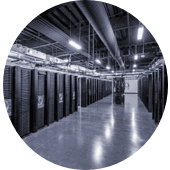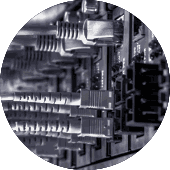Bare Metal Servers and Dedicated Cloud Hosting infrastructure providers in general, and those in Albany in particular, offer the following levels of security with their dedicated hosting services:
1. Physical Environment Security
Physical environment security refers to all physical aspects of the Albany data center facilities used to house bare metal servers. This includes the resilience against natural disasters, the physical design of the data center and the way the server rooms and cabinets are organized, as well as power redundancy, Internet network redundancy, and overall business continuity.
2. Network Security
Network security is part of the overall data center communications architecture. It includes the redundancy of fiber connectivity routes and the wide choice of ISPs and interconnection options.
3. Physical Server Security
This can also be referred to as "Bare Metal Server Security". It refers to the specific hardware components and configurations of the server that increase its uptime. These include the number of power supplies (PSUs) used, the number and capacity of network interface cards (NICs), the number and specification of hard drives used (SATA, SAS, SSD, NMVe, etc.), the use of RAID controllers, the Intelligent Platform Management Interface (IPMI, also known as ILO and iDrac by server vendors) for remote network access to the New York-based server, etc.
As a provider of Albany Edge Bare Metal Servers, HC automatically covers the highest possible industry standards regarding "Physical Environment Security" and "Network Security". Physical Server Security is a customizable element of the dedicated hosting server that is selected by the user of the physical server (i.e. the customer).
Most of our Albany dedicated servers include the following "Physical Server Security" by default:
- Redundant Power Supplies (PSUs)
- At least 2 x 1 Gbps physical Network Interface Cards (NICs)
- Intelligent Platform Management Interface (IPMI) and IPMI capabilities, except for the Edge servers, which are shipped with SSH management access only and are not recoverable in the event of an operating system (OS) failure that renders the server inoperable








